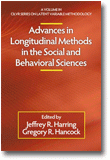
Advances in Longitudinal Methods in the Social and Behavioral Sciences
Edited by:
Jeffrey R. Harring, University of Maryland
Gregory R. Hancock, University of Maryland
A volume in the series: CILVR Series on Latent Variable Methodology. Editor(s): Gregory R. Hancock, University of Maryland.
Published 2012
The importance that practitioners are placing on longitudinal designs and analyses signals a critical shift toward methods that enable a better understanding of developmental processes thought to underlie many human attributes and behaviors. A simple scan of one’s own applied literature reveals evidence of this trend through the increasing number of articles adopting longitudinal methods as their primary analytic tools.
Advances in Longitudinal Methods in the Social and Behavioral Sciences is a resource intended for advanced graduate students, faculty, and applied researchers interested in longitudinal data analysis, especially in the social and behavioral sciences. The chapters are written by established methodological researchers from diverse research domains such as psychology, biostatistics, educational statistics, psychometrics, and family sciences. Each chapter exposes the reader to some of the latest methodological developments and perspectives in the analysis of longitudinal data, and is written in a didactic tone that makes the content accessible to the broader research community.
This volume will be particularly appealing to researchers in domains including, but not limited to: human development, clinical psychology, educational psychology, school psychology, special education, epidemiology, family science, kinesiology, communication disorders, and education policy and administration. The book will also be attractive to members of several professional organizations such as the American Educational Research Association (AERA), the American Psychological Association (APA), the American Psychological Society (APS), the Society for Research on Adolescence (SRA), the Society of Research in Child Development (SRCD), Society for Research in Adult Development (SRAD), British Psychological Society (BPS), Canadian Psychological Association (CPA), and other related organizations.
CONTENTS
Foreword. Preface. Acknowledgments. PART I: MODELING LONGITUDINAL DATA: EXAMINING FACETS OF CHANGE OR VARIABILITY. A Template for Describing Individual Differentces in Longitudinal Data, with Application to the Connection Between Learning and Ability, Robert Cudeck and Casey L. Codd. On Interpretable Reparameterizations of Linear and Nonlinear Latent Growth Curve Models, Kristopher J. Preacher and Gregory R. Hancock. Mood Changes Associated with Smoking in Adolescents: An Application of a Mixed-Effects Location Scale Model for Longitudinal Ecological Momentary Assessment Data, Donald Hedeker and Robin J. Mermelstein. Tethering Theory to Method: Using Measures of Intraindividual Variability to Operationalize Individuals’ Dynamic Characteristics, Nilam Ram, David Conroy, Aaron Pincus, Amanda Hyde, and Lauren Molloy. Dynamic Systems Analysis of Affective Processes in Dyadic Interactions Using Differential Equations, Emilio Ferrer and Joel Steele. PART II: DRAWING VALID INFERENCES: LONGITUDINAL DESIGN CONSIDERATIONS AND MODEL ASSUMPTIONS. Sensitivity Analysis of Mixed-Effects Models When Longitudinal Data Are Incomplete, Shelley A. Blozis. Finite Mixtures of Nonlinear Mixed-Effects Models, Jeffrey R. Harring. Growth Mixture Modeling and Causal Inference, Booil Jo. PART III: THE ROLE OF MEASUREMENT IN MODELING WITHIN-SUBJECT AND BETWEEN SUBJECT EFFECTS. Disaggregating Within-Person and Between-Person Effects in Multilevel and Structural Equation Growth Models, Patrick J. Curran, Taehun Lee, Andrea L. Howard, Stephanie Lane, and Robert MacCallum. Considering Alternative Metrics of Time: Does Anybody Really Know What “Time” Is? Lesa Hoffman. Valid Measurement Without Factorial Invariance: A Longitudinal Example, Michael C. Edwards and Robert J. Wirth. The Discrimination-Sensoring Paradox in Item Response Growth Models, Jennifer Koran. About the Contributors.
REVIEWS
"In the past 25 years or so, there have been many statistical and technological developments in analyzing longitudinal data, e.g. observations made on individuals over a period of time; this has occurred as more longitudinal data becomes available. Among the substantive concerns of different authors is growth in ability, mood change among adolescent smokers, social interactions, and intellectual development in children - each of these occurring over time. ... The authors of different papers in this edited book offer many methodological innovations that should advance the study of longitudinal data, e.g. using a mixture of linear and non-linear mixed-effect models for dealing with subpopulations among whom nonlinear change may be different." Dean H. Harper University of Rochester in SB&F
-
Paperback978-1-61735-889-0
Web price: $45.04 (Reg. 52.99)
-
Hardcover978-1-61735-890-6
Web price: $80.74 (Reg. 94.99)
- eBook978-1-61735-891-3

- EDU029040 - EDUCATION: TEACHING METHODS & MATERIALS: Social Science
- EDU027000 - EDUCATION: Statistics
- SOC024000 - SOCIAL SCIENCE: Research
-
 (Re)Envisioning Social Studies Education Research
Current Epistemological and Methodological Expansions, Deconstructions, and Creations
(Re)Envisioning Social Studies Education Research
Current Epistemological and Methodological Expansions, Deconstructions, and Creations
-
 Advances in Latent Class Analysis
A Festschrift in Honor of C. Mitchell Dayton
Advances in Latent Class Analysis
A Festschrift in Honor of C. Mitchell Dayton
-
 Advances in Multilevel Modeling for Educational Research
Addressing Practical Issues Found in Real‐World Applications
Advances in Multilevel Modeling for Educational Research
Addressing Practical Issues Found in Real‐World Applications
-
 Beyond Single Stories
Changing Narratives for a Changing World
Beyond Single Stories
Changing Narratives for a Changing World
-
 Healing While Studying
Reflections and Strategies for Healing, Coping, and Liberation of Graduate Students of Minoritized Identities
Healing While Studying
Reflections and Strategies for Healing, Coping, and Liberation of Graduate Students of Minoritized Identities
-
 Teaching Peace Through Popular Culture
2nd Edition
Teaching Peace Through Popular Culture
2nd Edition
-
 The Fear Problematique
Role of Philosophy of Education in Speaking Truths to Powers in a Culture of Fear
The Fear Problematique
Role of Philosophy of Education in Speaking Truths to Powers in a Culture of Fear

